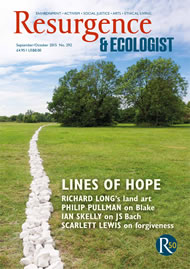It’s hard to imagine two books covering the same broad theme being so completely different. Dieter Helm’s Natural Capital: Valuing the Planet is highly informative, dry, detached, rigorous and more than a little irritating; Tony Juniper’s What Nature Does for Britain is equally informative, warm, personal, full of somewhat episodic encounters, politically engaged, but ultimately evasive.
The shared theme couldn’t be more topical: can we better protect the natural world by valuing Nature differently? Both authors are clear that we’re doing a lousy job today, that business-as-usual environmentalism is highly unlikely to change that, and that we need to get our act together in short order. And both authors are unpersuaded by critics who argue that putting monetary value on Nature is a political and philosophical error of massive proportions.
Helm is an academic with a long and illustrious career in informing and shaping the environmental economics agenda today. He’s a zealous believer in the power of markets to sort out the allocation of scarce resources, and correspondingly dismissive about the role of regulation. He’s totally committed to “embedding the environment at the heart of our economy”, and wants decision makers to treat Nature as a “set of assets which can be valued in economic calculations”, with natural capital parcelled up as so many “units of measurement”. Only on that basis will it be possible to incorporate Nature into both our national accounts and corporate reporting.
To achieve this, he recommends what he calls “an asset-based natural capital rule: the aggregate level of natural capital should not decline” as a consequence of new economic development. And he elaborates his rule with a number of specific policy prescriptions: pollution pricing; eliminating perverse subsidies; compensation for the loss of renewable resources; levies on the depletion of non-renewable resources (fossil fuels, minerals, and so on), and the provision of “natural capital public goods” such as Marine Protected Areas.
None of this is new, as the author himself acknowledges, but it’s authoritatively and comprehensively brought together in order to secure a new sense of policymaking purpose. Anyone interested in the technical aspects of valuing the natural world will be richly rewarded by his insights and expertise.
But Helm always has more than one subtly hidden agenda on the go. The first is his near-visceral loathing of NGOs. He can’t resist the temptation to put the boot in at every available opportunity, either through snide little insults (“doomsters”, “utopians”, “modern Malthusians”) or through categorical assertions that they are wrong.
In this cause, he’s prepared wilfully to misrepresent the body of work around the ‘Limits to Growth’ thesis, to dismiss out of hand those who take a more ethical line than his own mechanistic approach (including Lord Stern, one of today’s most important contributors to the debate about the economics of climate change), and to belittle the potential for the kind of technologies that he can’t quite get his “big energy brain” around. “Not impossible” is the studied understatement that Helm uses to characterise a potential breakthrough in solar energy – at a time when it’s already going on all around him.
His second hidden agenda is to persuade people that there’s something out there called “sustainable economic growth”. Having reminded us that the global economy, on a business-as-usual growth rate, will be 16 times bigger in 2100 than it is today (doubling every 15 to 20 years), he would still have us believe that a “sustainable growth path”, having taken natural capital properly into account, is still an intellectually coherent, viable policy prescription. Really?
No such economically illiterate nonsense will be found in Tony Juniper’s What Nature Does for Britain – but only because he avoids precisely those difficult issues, such as the viability of exponential economic growth. He just chooses to leave all that to one side, to focus on critical but somehow narrower questions.
He also detours into some interesting but ultimately irrelevant areas, including a long section on the politics of climate change, the emergence of the divestment movement, and other issues close to his heart. Nothing much to do with what Nature does for Britain, but he carries it off with his easy, discursively accessible style of writing.
The biggest contrast between the two books, however, is not so much stylistic (though that is significant) as in the choice of language and the specific issues the authors use to illustrate their theses. Whilst one is never quite sure whether Dieter Helm has spent any time whatsoever in the natural world he seeks to attribute monetary value to, Tony Juniper is out there all the time, embedded in that world. While subscribing to the same overarching objective as Helm (to persuade decision makers and environmental campaigners that developing robust ways of pricing our use of the natural world is critical), Juniper eschews (for the most part) the language of assets, monetised units of value, and even ‘natural capital’ itself.
As to thematic content, Juniper is very strong on land-based issues: soil quality, food security, peatlands and bogs, flood control, forestry, carbon sequestration, pollination, and so on. He visits and talks to a lot of people involved on that front line of valuing (in radically different ways) both land and the ‘ecosystem services’ we draw down from the use of that land. Many of these make compelling witnesses, significantly reinforcing the valuation themes that are being explored.
For me, the single most important material that Juniper refers to relates to the importance of the natural world in terms of human health and wellbeing. There is now an immensely impressive body of evidence demonstrating improved health outcomes from access to and enjoyment of the natural world, particularly for elderly people and people with mental health issues. Improved health outcomes translate directly into avoided costs for Britain’s massively overstretched National Health Service.
All of which leads Juniper to a trenchant critique of the dingbats in government today who simply ignore this evidence – who continue to see Nature, in the round, as a barrier to progress and economic development. He rightly singles out George Osborne as the principal offender here, citing his attacks on the EU’s Habitats Directive and other critical environmental protection measures on the grounds that these are just regulatory red tape holding back frustrated entrepreneurs. What is it about today’s politicians, he asks, that prevents them from understanding the true economic value of Nature, in strict profit-and-loss terms? Could it have something to do with the kind of economists that advise them?
These are both important and well-written, substantive books. I genuinely recommend both – with a few health warnings thrown in along the way!








